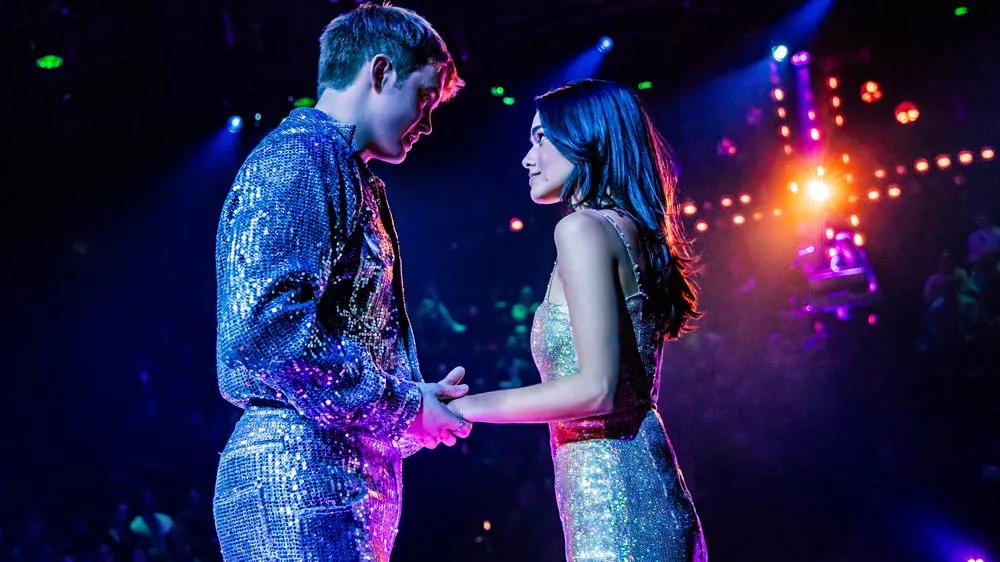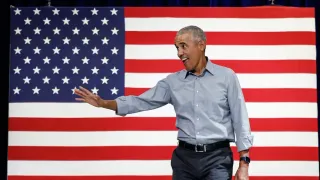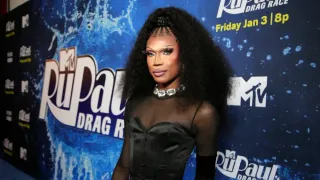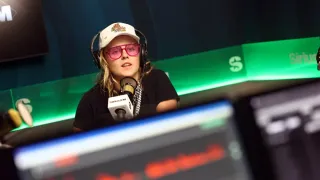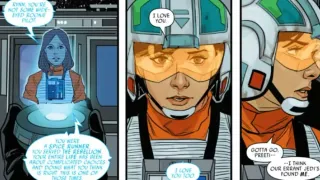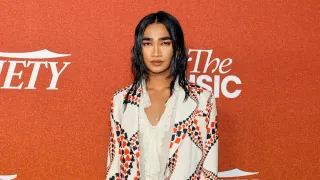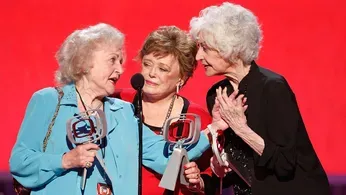
Jun 20
40 Years On, That Bea Arthur-Betty White 'Golden Girls' Feud Won't Go Away
READ TIME: 5 MIN.
It's been 40 years, but that feud between Beatrice Arthur and Betty White just won't go away.
It came up again as part of the monthlong Pride LIVE! Hollywood festival, which featured a panel of writers, producers, and others who worked on the show, which ran for seven seasons (1985-92) on NBC, The Hollywood Reporter detailed. (The Hollywood Reporter is the presenting media sponsor of Pride LIVE! Hollywood.)
On the show, Arthur played Dorothy Zbornak, who invites Rose Nylund (White) and Blanche Devereaux (Rue McClanahan) to live in her Miami home with her and her mother, Sophia Petrillo (Estelle Getty). Watching the show, it was impossible to detect any tension between the four, but co-producer Marsha Posner Williams brought up a topic that has been much discussed and speculated on: Whether Arthur and White got along in real life.
"When that red light was on [and the show was filming], there were no more professional people than those women," Posner Williams quipped, "but when the red light was off, those two couldn't warm up to each other if they were cremated together."
Arthur, she went on to relate, "used to call me at home and say, 'I just ran into that c'" – meaning White, using the c-word – "'at the grocery store. I'm gonna write her a letter,' and I said, 'Bea, just get over it for crying out loud. Just get past it.'"
She continued: "I remember, my husband and I went over to Bea's house a couple of times for dinner. Within 30 seconds of walking in the door, the c-word came out."
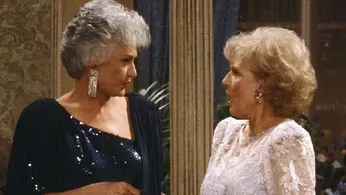
Casting director Joel Thurm "noted that he heard Arthur call White that word as well while sitting next to her on a flight," THR relayed. "It's a story he shared a few years ago on a podcast and then got surprised at the internet's response over his revelation."
"The panelists differed on their theories about why the two didn't get along," THR continued.
"Co-producer Jim Vallely thought it was because White got a lot more applause during cast introductions ahead of tapings, but Williams shot that down, noting that Arthur hated doing publicity and came from a different background (theatrical) than White (television)."
"The show would have continued after seven years," Willaims shared. "Their contracts were up, and ... the executives went to the ladies, and Estelle said, 'Yes, let's keep going,' and Rue said, 'Yes let's keep going,' and Betty said, 'Yes, let's keep going.' And Bea said, 'No fucking way,' and that's why that show didn't continue. ... And Betty would break character in the middle of the show [and talk to the live audience], and Bea hated that."
Thurm added that Brandon Tartikoff, head of NBC Entertainment at the time, "originally did not want Arthur in the show." Series creator Susan Harris, who had worked with Arthur on "Maude," "was dead-set on her" after having worked with Arthur on "Maude."
Tartikoff resisted, according to Thrum, because of Arthur's low likability rating in her Q scores, which are used to evaluate the public's favorability toward brands, products, companies – and, yes, famous people.
The disagreement between Tartikoff and Harris :created a big problem," Thurm recounted, "but I never knew how dug in Susan was, because I just wasn't in the room where those kind of discussions happened.
"So my job, according to Brandon, was to find someone that Susan would be happy with instead of Bea Arthur," Thurm continued. "I should have realized that she wouldn't have been happy with anybody besides Bea, but I was too naive, and I thought, 'Oh, I have someone. Her name is Elaine Stritch. She has the same acidic quality, you know, stare at you and give you the same thing that Bea does.'"
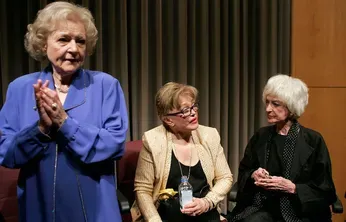
No one else seemed to see it that way, Thurm added – and it was obvious when Stritch came in to audition.
"So this woman had to walk into a freezer of an office and try to make it funny," Thurm recounted. "Stritch asked Susan one thing – it was something like, 'Is it OK if I change something?' And Susan said, 'Yes, only the punctuation.'
"There was no love in that room. I felt so sorry for poor Stritch, because it wasn't her fault. She didn't do anything. And had I known that... Susan was immovable on this, I wouldn't have done what I did and then try to find somebody else."
Williams remembered things differently. "I want to just say that I worked on a pilot," she said, "and Elaine Stritch was a guest star for one day. Before the day was half over, we were calling her 'Elaine Bitch.'"
Getty was the first of the quartet to be cast, the panel shared. "She did her homework and prepared for the part," Thurm said.
While the show highlighted queer issues, including Blanche's brother coming out and Sophia coming to terms with her trans son, a different attitude held sway on the set. "People have to remember back then, we were told by representatives to stay in the closet, so nobody knew we were gay," writer Stan Zimmerman told the room. "Our first day on the set, we noticed Estelle come running towards us, and she's like ... 'I know. Your secret's safe with me. You're one of us.'
Joked Zimmerman, "I thought she meant Jewish. But she meant gay. She wasn't gay, but she was probably the first ally ever."
Zimmerman told an anecdote about going to a garage sale and picking up some vintage sweaters. When he mentioned his acquisitions to his colleagues, their response was to tell him to "go home and burn those sweaters because it was probably somebody that died of AIDS," he said. "That was the climate then.
"I know you see all these progressive scenes and you think, 'Oh, it was one big gay party there,' but we couldn't be who we really were," he added.
Series writer Jim Vallely speculated that queer themes came up so often in the show "because we knew... we had a gay audience," THR relayed.
"They would play [the show] in [gay] bars across the country," Vallely pointed out. "It was a big deal for middle America to see these women embrace the gay culture."
